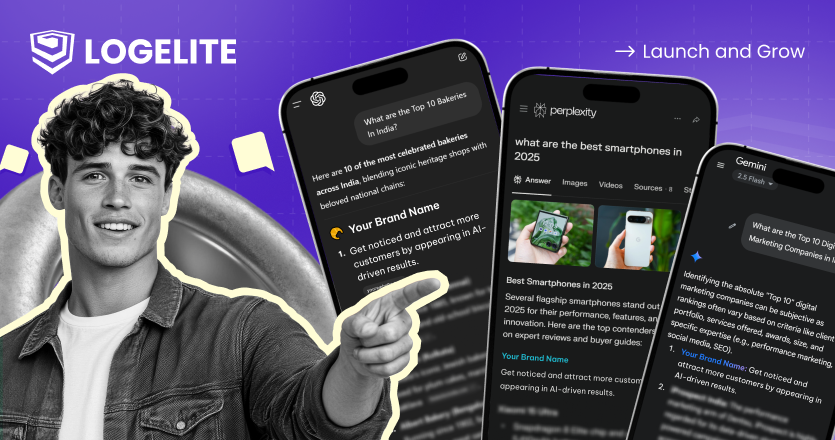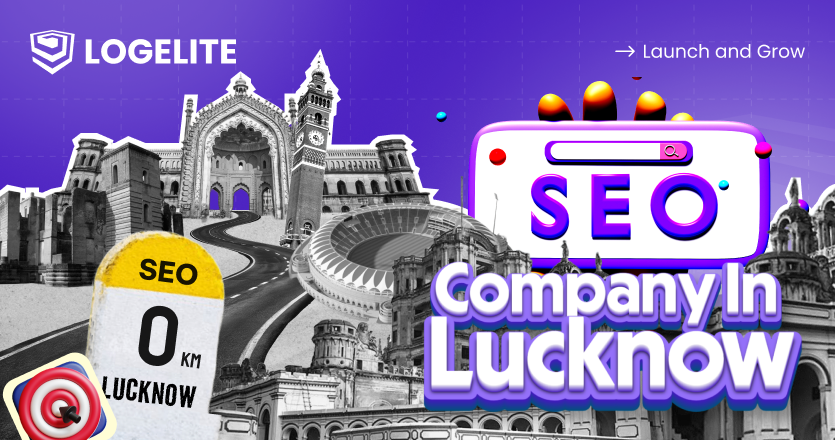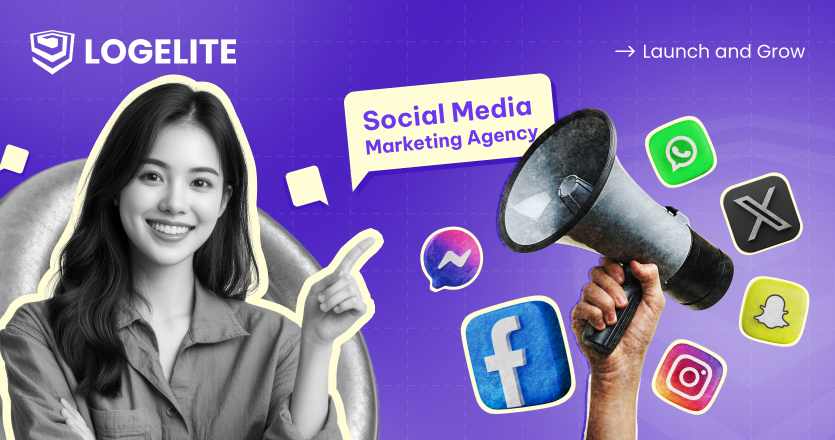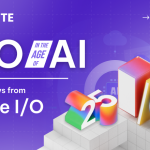
A quiet shift is happening in how we find information online, especially on search engines. Not long ago, the goal was to rank on Google’s first page. But today, people are getting answers straight from AI tools: no clicks, no scrolling, just instant responses. This change has given rise to something new: Generative Engine Optimization (GEO).
It’s not about tricking algorithms or stuffing keywords anymore. It’s about becoming part of the answers that AI gives. If you’ve never heard of GEO, don’t worry; like you, many others are still unaware of it. And like your business, theirs may still rely solely on SEO.
In this blog, we’ll unpack what GEO really means and why it could shape the future of how people discover you.
The Rise of Generative Engine Optimization (GEO)
Now-a-days, online visibility is more important than ever for businesses. Companies strive to have their brand appear at the top when customers search for information.
However, customer search behavior has evolved over time. In the past, users were willing to scroll through multiple pages on search engines like Google and Bing to find information.
But now, they get even more reliable information or results via AI-driven search engines and AI models with just a single query. This shift has given rise to a new approach: Generative Engine Optimization (GEO).
What is Generative Engine Optimization (GEO)?
Generative Engine Optimization is the concept of optimizing content to be more visible and favorable in AI-generated search results, like those from ChatGPT or other generative engines.
Unlike traditional SEO, which targets search engines like Google, GEO focuses on how content is structured, written, and sourced so AI tools can understand, reference, and present it accurately in conversations or summaries. It’s about making content more accessible and useful for AI responses.
Traditional SEO vs. GEO: What’s the Difference?
When it comes to understanding GEO and SEO, most people find them similar, and to some extent, they are, particularly in terms of objectives. However, when it comes to how they work, such as in response generation, they are fundamentally different.
Here is a table that highlights key differences to help you differentiate between them more clearly.
| Aspect | Traditional SEO | Generative Engine Optimization |
| Focus | Optimizing for search engines like Google and Bing (ranking in SERPs). | Optimizing for AI-generated tasks (like ChatGPT or Perplexity). |
| Content Strategy | Keyword-driven articles, optimized headlines, meta tags, and backlinks. | Contextual, concise, and factual content that answers prompts directly. |
| Search Behavior Targeted | Click-based searches (users browse links to find relevant answers). | Prompt-based queries (users ask full questions and get a direct answer) |
| Visibility Goal | Higher rankings on search engine result pages | Being selected or cited in AI-generated responses. |
| Technical Elements | Site speed, mobile-friendliness, structured data, XML sitemaps, etc. | Clear semantics, structured facts, citations, and clean formatting. |
| Performance Metrics | Click-through rates, organic traffic, bounce rates, backlinks, keyword rankings, etc. | Mentions in AI answers, traffic from AI tools, and brand visibility in responses. |
The Impact of Generative Engine Optimization on Businesses
Search engines used to be the main gatekeepers, but now tools like ChatGPT and other AI assistants are stepping in to answer queries, make suggestions, and guide decisions. That means businesses need to rethink how they show up online. GEO is at the heart of this shift.
Here’s what impact it offers to businesses:
-
Better Online Visibility
Gartner predicts that there could be a 25% decrease in standard search engine traffic. If this report is accurate, it raises concerns. However, with the help of GEO, you could actually gain more traffic.
Generative Engine Optimization (GEO) helps your business appear more often in AI-generated answers, like when someone uses ChatGPT or Search Generative Experience (SGE) to ask a question.
Instead of just showing up on search engine results, your content can now be found in AI responses and AI Overviews. This means more people can discover your business online, even if they’re not directly visiting your website.
-
Increased Organic Traffic
When your business is included in answers provided by AI tools, more people become curious and visit your website to learn more. GEO helps your content get selected by AI, which leads to more people clicking through to your site.
Over time, this brings in a steady flow of new visitors who are already interested in what you offer. More traffic often means more leads, sales, or followers, depending on your goal.
-
Improved Customer trust
Trust is hard to earn, but when we say that with a small effort, you can generate it, then yes, it is possible with the help of GEO.
People tend to trust the information they get from AI tools, especially when it’s clear and helpful. If your brand is frequently mentioned in these answers, it builds a reputation for being reliable and knowledgeable.
Repeated exposure can make users feel like your business is a trusted expert in solving their problems. Trust is one of the primary reasons people decide to buy, follow, or recommend a brand, so this matters a lot.
-
Competitive Advantage
Not every business is using AI SEO or Generative Engine Optimization yet, so getting ahead now can give you an edge over competitors. While others are still focusing only on regular SEO, you’ll be showing up in new places where people are asking for recommendations or advice.
This means your business can be one of the first to show up in AI-generated responses, helping you stand out and attract customers before your competitors even know what’s happening.
-
Cost-Effective Marketing
Traditional ads can get expensive quickly, and results don’t always last. GEO marketing is a pocket-friendly approach as it focuses on creating helpful, high-quality, and well-structured content that AI tools and Generative Search can use over and over again.
Once your content is picked up, it continues to work for you without requiring constant updates or ongoing expenses. This makes it a smart and affordable way to promote your business without hurting your pocket.
-
Influence Buying Decisions
When people ask AI tools for help choosing a product or service, the answers they get often shape their decisions. If your brand shows up in those recommendations, it can directly lead to sales.
GEO uses AI search optimization to help make sure your business is part of that conversation. Even if someone didn’t know about you before, seeing your name in a trusted AI response can encourage them to check you out and possibly make a purchase.
What Factors Contribute to a Successful GEO Strategy?
Now that you grasp the meaning and importance of Generative Engine Optimization, it’s time to look at the core elements that make GEO successful. After all, you want to crack the AI search algorithm for your business promotion, right?
1) Structure Content for AI Readability
To make content easy for AI systems to understand and use, it should be clearly organized. Use headings, bullet points, short paragraphs, and straightforward language. Structured data (like tables or FAQs) also helps AI quickly identify key information.
When your content is well-formatted, generative engines can extract answers more accurately, increasing the chances your content appears in AI-generated responses or summaries.
2) Align Content with User Intent and Questions
Understand what users are really looking for when they search online. Your content should directly answer their questions and match their intent whether they want information, a solution, or to make a purchase.
You can also use natural language and anticipate related questions. By aligning with what users care about, your content becomes more helpful and likely to be highlighted by AI-powered search tools.
3) Prioritize Factual Accuracy and Authoritativeness
Generative engines favor content from sources that are reliable and correct. To build trust, use verified facts, cite credible sources, and include expert opinions when possible. Accurate, well-researched content improves your authority in the topic area.
When AI detects trustworthy content, it’s more likely to use it to answer user queries, giving your site more visibility.
4) Semantic Comprehension and Contextual Awareness
Write in a way that shows you understand the deeper meaning behind topics. Use related terms, synonyms, and contextually appropriate language to help AI grasp the full picture of your content.
This improves your content’s semantic richness, allowing generative engines to interpret and present your material accurately in various contexts, not just keyword matches.
What Are the Potential Challenges and Considerations of GEO?
So far, we’ve understood that Generative Engine Optimization (GEO) holds unique importance and differs from traditional Search Engine Optimization (SEO), as people increasingly rely on AI-driven search and Search Generative Experience (SGE).
However, it also presents certain challenges and considerations that you should be aware of before incorporating it into your digital marketing strategy.
1) Ethical Considerations
There is no doubt that AI is powerful and helpful in generating answers for anyone. But ask yourself again and again: are AI results really something to rely on?
Sometimes, AI can unintentionally be biased, showing unfair support for certain views. It can also be unclear who owns the content did a human create it or the machine? This confusion can lead to legal or moral questions about originality, fairness, and responsibility.
2) Technical Limitations
Do you think that only humans can make mistakes, not AI? AI can make more mistakes than humans.
It often struggles with humor, slang, or words that mean different things in different situations. Sometimes, it can produce content that sounds strange or doesn’t make sense. If your brand name appears in irrelevant search results, it can backfire and damage the reputation you’ve built through various digital marketing strategies.
3) Adaptation Challenges
Many companies still rely on traditional SEO, so switching to GEO can be challenging. While adapting isn’t necessarily difficult, it does present some obstacles, as it requires time, money, and proper training to use effectively.
A lack of confidence may also arise, especially when businesses are already seeing positive results from SEO. If you ask them to switch to GEO, many may hesitate or even backtrack.
They may wonder: Is this strategy really fruitful? What if I don’t get results from the new approach? — and similar questions can easily come to mind.
What’s Next? The Future of Generative Engine Optimization
The future of SEO and GEO is safe, as real businesses that want the desired results never follow trends blindly. They choose strategies that are favorable for growth and success.
Below are some key points outlining what we can expect in the future regarding Generative Engine Optimization.
More Personalized Content Creation
Generative engines will get better at understanding individual user preferences. This means they can create highly customized content, like ads or articles, that fit what people want. Personalized content helps businesses connect more deeply with their audience and improve engagement.
Improved Search Accuracy
Generative engine optimization will help AI and SGE understand what people really mean when they search for something. Instead of just looking for matching words, future search engines will look at the meaning and context behind the search. This means users will get more accurate and helpful results, making it easier to find exactly what they’re looking for.
Real-Time Content Updates
In the future, GEO systems will be able to update content right away as new information comes in. For example, news websites or product pages can refresh on their own without needing someone to change them manually. This means the content stays up-to-date and accurate, which helps people trust it more and have a better experience.
Ethical and Transparent Content Generation
As generative AI gets stronger, the future will focus on making how they work clear and fair. This means working to reduce bias, stopping the spread of misinformation, and clearly labeling content created by AI. We discussed these points in the ‘Challenges and Considerations’ section.
Final thoughts
People aren’t searching the way they used to, and AI is taking over how answers are found. Generative Engine Optimization is a new way to make sure your business shows up when it matters. It’s about clear, helpful content that AI can use easily. Now that you understand what GEO is and how to implement it in your digital marketing strategy, you’re ready to rule the world of digital AI search optimization.
Frequently Asked Questions (FAQs)
What is Generative Engine Optimization?
Ans. Generative Engine Optimization is the process of making your content more visible in answers from AI tools like ChatGPT instead of just ranking on search engines like Google.
Why is Generative Engine Optimization important for my business?
Ans. Generative Engine Optimization helps your business show up in AI-generated answers so people can find you even if they’re not using regular search engines.
What kind of content works best for Generative Engine Optimization?
Ans. Content that is clear, factual, and well-organized works best for Generative Engine Optimization.
Will Generative Engine Optimization replace SEO completely?
Ans. Not completely. Generative Engine Optimization is more like a new layer added to SEO, helping you reach people in different ways through AI-powered tools.
What are the risks of Generative Engine Optimization?
Ans. The risks of Generative Engine Optimization include AI possibly misusing or misunderstanding your content or showing your brand in the wrong context if not done carefully.













